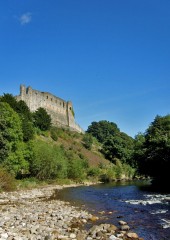Most jobs within archaeology are field-based or related in some way to commercial archaeology. A job in field archaeology is one where every day you are in contact with the past, maybe unearthing objects that haven't seen the light of day for hundreds, or even thousands of years, or deciphering the outlines of an ancient, long-forgotten settlement. In short, it is a fascinating and demanding career.
Richard Newman is currently a site supervisor within the Cambridge Archaeological Unit (CAU) and has been working a professional archaeologist for 12 years. He has very kindly agreed to do an interview for the Post Hole to give us a bit of an insight into the daily life and times of a field archaeologist...
KN - How and why did you enter into field archaeology?
RN - I've actually been interested in archaeology from a very young age. I was a member of the Young Archaeologists Club (YAC) in my home town, volunteered as a teenager with my local archaeological unit and then pursued a degree in archaeology. Volunteering on projects is very important and gains you much needed experience, so I'd recommend that very strongly. Getting your first job in field archaeology is always the hardest -many employers require 6 months experience, so having a number of volunteer digs in hand is never a bad thing.
KN - Why do you enjoy field archaeology?
RN - Mud and big holes! Other than that, most people who study archaeology in any depth start to find one period or artefact that they find particularly captures their attention - but you can almost guarantee that the one type of site of that particular period or with that particular material culture is the one you will never get to work on. In reality you can't pick and choose the sites you dig, you just have to find some intriguing aspect or fascinating problem to solve on every site you come across - and you will come across a wide range of sites. In the last year alone I have excavated everything, from a Palaeolithic river bed to a 20th century telescope. The challenge, and fun, of being a field archaeologist is finding something that interests you everywhere you work - whether that be digging big holes, finding things or solving problems.
KN - Considering that an interest in a certain period or artefact type is normally what draws people into the profession, what would you say is your specialist field of interest?
RN - Well, personally I'm quite interested in deep stratigraphic sequences. You might expect to find such sites in urban areas that have seen the foundations of numerous buildings or Tells in the Near East, and they display a constantly changing sequence. Unlike landscape archaeology, where often each area of land has its own unique story to tell, with deep stratigraphic sequences you see one story piled on top of another, changing layer by layer. It gives you a very in-depth understanding of a small area and allows you to refine almost every archaeological technique in existence in order to cope with the complex sequence, giving you information and problems in equal measure. I'm actually currently working on a site with quite deep stratigraphy - there are buildings that are three hundred years old, on top of a cemetery, on top of a potential Saxo-Norman settlement!
KN - What projects are you currently working on?
RN - At the moment, I'm excavating the basement of a standing listed building, which is being converted for modern use. We need to excavate down to 3-4 metres below ground level, which is tricky considering that we're working undern>eath a building. We currently have a conveyor belt to take the spoil away through the building! I have a couple of other projects where the excavation element has been completed and they're at stages varying between organising the specialist reports that need to be completed and some nearing publication.
KN - Clearly it sounds like you're a very busy man! Can you describe a typical day in the life of a site supervisor?
RN - A typical day varies wildly between two extremes - a day on-site and a day in the office. On a field day, my main responsibilities include making sure that everyone knows the current tasks they're supposed to be working on, co-ordinating the digging efforts and making sure that everyone's aware of what needs to be done next. On a post-excavation day, I'd be in the office, co-ordinating the specialist reports that need to be completed and composing the main grey literature reports, in preparation for potential publication, for whatever projects I'm working on at the time. Mainly it's only the big sites that make it to publication, and even then that depends on the material unearthed being considered interesting enough. Sadly, a lot of sites are deemed to be too uninteresting, although some are saved up and published in one amalgamated volume at a later date.
KN - In your time as an archaeologist you must have worked on many, many different sites. Are there any that stand out as your best or worst digs?
RN - I find that the best sites are often the ones that surprise you - when you're excavating a small site that no-one's expecting much of and you find something amazing! On some sites I have found gold jewellery and other similarly valuable artefacts, but the finds that really stand out in my mind are the things that give you a real connection with the people who created or used them. For example, on some wet or waterlogged sites you can find evidence of woodworking where you can still see all the tool-marks preserved in the bark and the woodchips still laying where they were discarded - as if whoever had made the marks had only just left. I love those kinds of immediate connections to people - another example might be when you find mistakes, a piece of pottery gone wrong or a mark where a chisel slipped, ruining the piece and you can almost feel their frustration as they threw it onto the rubbish heap and went back to start again. It seems to give you a small insight into a person, one who lived and died so long ago, and makes them human and recognisable - if the sites your digging are within the historic period it can even be possible to find documentary sources telling you who was living in the area at the time, thus deepening the personal connection. One of my best finds was actually a bowling ball and set of dominoes that had been thrown into a well! On the other hand, some of the worst sites I've worked on were those where there were too many things to investigate in the time we had planned! It's always very frustrating when you can't study features in as much detail as you'd like to.
KN - So, my final question! Would you recommend a job in the field to anyone currently undertaking, or completing, a degree in archaeology?
RN - It's a lot of hard work and you do have to endure some rough conditions, but if you're interested in archaeology it's worth trying. I think you've got to recognise that it's not everyone's ideal job, but it can be very rewarding.




